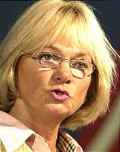 COPENHAGEN, Denmark — Raving xenophobe or fearless defender of Danish values? Nationalist leader Pia Kjaersgaard’s anti-Muslim outbursts have earned her many labels — and many votes.
COPENHAGEN, Denmark — Raving xenophobe or fearless defender of Danish values? Nationalist leader Pia Kjaersgaard’s anti-Muslim outbursts have earned her many labels — and many votes.
Despite predictions of her populist Danish People’s Party’s demise, Kjaersgaard remains a powerful force in domestic politics after winning 14 percent of the vote in last week’s election.
“The most important thing for the Danish People’s Party is to maintain the Danish identity,” Kjaersgaard, 60, told The Associated Press in an interview. “I am convinced that the Islamists want to sneak Sharia (Islamic law) through the back door, that they want to combat Western society and they want Islam to become the main religion,” she said.
Her party — Denmark’s third biggest — has held the role of kingmaker since 2001, giving the center-right government the backing it needs for a majority in Parliament. In return, Kjaersgaard has been able to press the government to adopt some of Europe’s strictest immigration laws, which she says have been instrumental in stemming the inflow of Muslims with radical views.
There are an estimated 200,000 Muslims among Denmark’s 5.4 million residents.
“The individual Muslim has never been a problem for Danish society. But their number has,” Kjaersgaard told AP in her office, decorated with Danish flags and paintings depicting Danish landscapes. To emphasize her point, she said she shops at a grocery store owned by a Turkish Kurd who respects Danish laws and culture. “He has a lot of great stuff — fruits, vegetables — and he’s a good friend of mine,” Kjaersgaard said.
The flow of asylum-seekers has dropped by 84 percent since Denmark tightened its immigration laws in 2001. There is now broad agreement across party lines to maintain the system.
But critics say the Danish People’s Party has polarized Danish society by bashing Islam and stereotyping immigrants as welfare cheats. “She is a scare-mongering populist and opportunist,” said Holger K. Nielsen of the left-wing opposition Socialist People’s Party. He added Kjaersgaard was a skillful politician who has tapped into undercurrents of nationalism and worries over immigration among Danes.
During last year’s uproar over Danish caricatures of the Prophet Muhammad, Kjaersgaard and other leading party members took turns blasting Islam as incompatible with Danish traditions including free speech. Ahead of the Nov. 13 election, one of the party’s campaign posters showed an artist’s hand drawing a picture of Muhammad, with the text “Freedom of speech is Danish, censorship is not.”
“Sometimes I wonder what other people think about me — ‘is she a monster?'” Kjaersgaard conceded in a moment of introspection. “I need to brush these things off, otherwise I will go down.” Kjaersgaard, who lives with round-the-clock police protection, quickly added she has no regrets about anything she has said.
She rejects accusations of racism and comparisons to far-right parties across Europe such as the National Front in France. “There is nothing racist about what I have said, I know that. I have a clean conscience,” she said. “My driving force is the love for my home country. … I want Denmark to be a safe and good and cozy nation that has a good relationship to the rest of the world.”
When asked if she thought Islam can contribute to Danish society in any way, she replied: “I don’t think so at all.”
